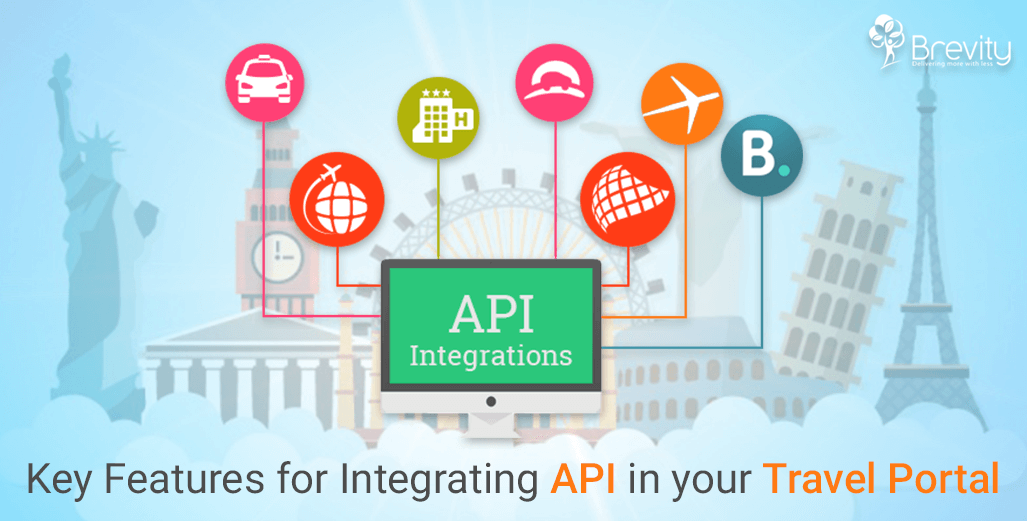
Travel API is fundamentally a set of web services to get to the travel portal development from various travel consolidators. GDS, hotel APIs, 3rd party flight APIs — all are utilized by travel agencies to get to the travel deals on the web.
In recent years, with the development of search engines and OTAs, individuals expect data readily available at whatever point they need, wherever they need. By chance that you do not have the information individuals are searching for, they will right move to your competitors who do. The Travel industry has turned out to be progressively aggressive and it’s the survival of the fittest.
What Travel APIs mean?
In a simple context, an API permits you to incorporate 3rd party GDS/Wholesaler inventory/feeds into the booking engine on your site. So when a client makes an inquiry to book a flight or a hotel on your website, they won’t be diverted to another site and the payment will be collected by you.
Much the same as suppliers give APIs to give you access to their banks, feeds and other payment processors likewise give APIs to utilize their services. By incorporating the API of a payment gateway, the travelers would have the capacity to make secure payments utilizing their debit card or credit card. There are various payment gateways accessible and your travel technology solutions partner may help in picking the correct one.
Advantages of Travel APIs
- It is you who will get the payment without deviation from clients
- You can include markups for your agents/end-clients
- Least maintenance of content that will permit you to concentrate on your center tasks like advertising and making various packages
- Reduce Travel and Tourism agencies operating costs on a long run
- Provide exceedingly dynamic information came back from the XML pages
The following are the steps required in API Integration:
Agreement and API Documentation
While selecting the supplier you require for the contract, you sign an API contract with the supplier. A supplier may have numerous APIs to offer for various modules. The same contract encloses all modules you opt for; however, the APIs will be discrete. You will be required to give insights about your business — like the sorts of products or packages you offer, your yearly bookings, website traffic and so forth. As specified before, you may likewise need to pay a deposit. Be that as it may, by chance that you have a decent relationship and you have given great volumes, the API cost of the supplier can be haggled or even you get FREE of cost. It relies on upon a case to case basis.
Choosing Supplier
While picking a supplier, do careful research to ensure you pick a provider that is best for your Travel organization, in view of your area, their availability, requirements, rates and so forth.
One Supplier may have better rates and an extensive variety of hotels in your locale than another supplier, so check their availability and rates in advance. Additionally, not each provider gives different modules (eg hotels, air, activities and so forth) in their API.
After Integration
Once the integration is finished and accepting your site is live, your customers will begin seeing real-time rates and accessibility for the modules you have coordinated when they make a search. One of the worries a considerable amount of travel agents have is the search response speed.
The search response speed relies on upon various factors, including server location, the planning of the booking engine, the goal for which the search is made (cities with more hotels will take more time to show up), number of APIs integrated (as the booking engine would call every API when accumulating results) and so on. The most imperative element is the supplier response time. A few providers take more time to react than other.
Classification of the API archive and Development
Upon the receipt of the API documentation, your technology partner will go through the API and its specialized plausibility with respect to their booking engine. It helps them choose if the API is ready-to-deploy or if they should roll out improvements to their XML connector or even create a totally new connector for it.
Authorization and Unification
Once the connector is prepared, it should be guaranteed by the supplier, to guarantee it consents to the supplier’s benchmarks. For existing associations, Hotel suppliers more often take around two or three week’s time to finish the confirmation, while for recently created connectors it can take around a month. GDS’s generally have long certification lines and may take a few more weeks, so you should be persistent.
Once the accreditation is finished, the supplier will give you credentials to get to their live feeds which can be used to make bookings.